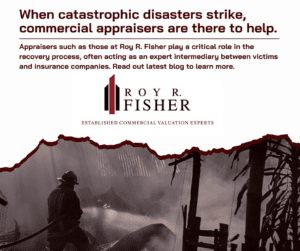When catastrophic losses occur, such as fire, natural disaster, or structural failure in a building component, the role of an appraiser becomes critical. Appraisers are often called upon to assess the extent of the damage and provide an accurate valuation of the property post-disaster. This valuation is essential for insurance claims and can significantly impact the recovery process for property owners.
Appraisers, like ours at Roy R. Fisher, are trained to handle these situations with professionalism and precision. Appraisers must consider various factors. These include the extent of the damage, the feasibility and cost of repairs, and the impact on the property’s overall value. They understand the importance of their role in the recovery process and strive to provide fair and accurate appraisals.
In some catastrophic loss cases, appraisers can be called on to provide expert testimony. Their unbiased, professional opinions can greatly aid in resolving disputes between insurers and policyholders. They provide an objective assessment of the property’s value, which can help ensure that victims are adequately compensated for their losses.
At Roy R. Fisher, we understand the importance of appraisal services in the aftermath of catastrophic loss. Our team of experienced appraisers is committed to providing fair and accurate valuations to help property owners, lenders and insurance companies navigate the recovery process. If you’ve experienced a catastrophic loss and need an appraisal, contact us today. We’re here to help.
For more information on our services and the appraisal process, check out our services page and our blog post on translating complex commercial property language.


